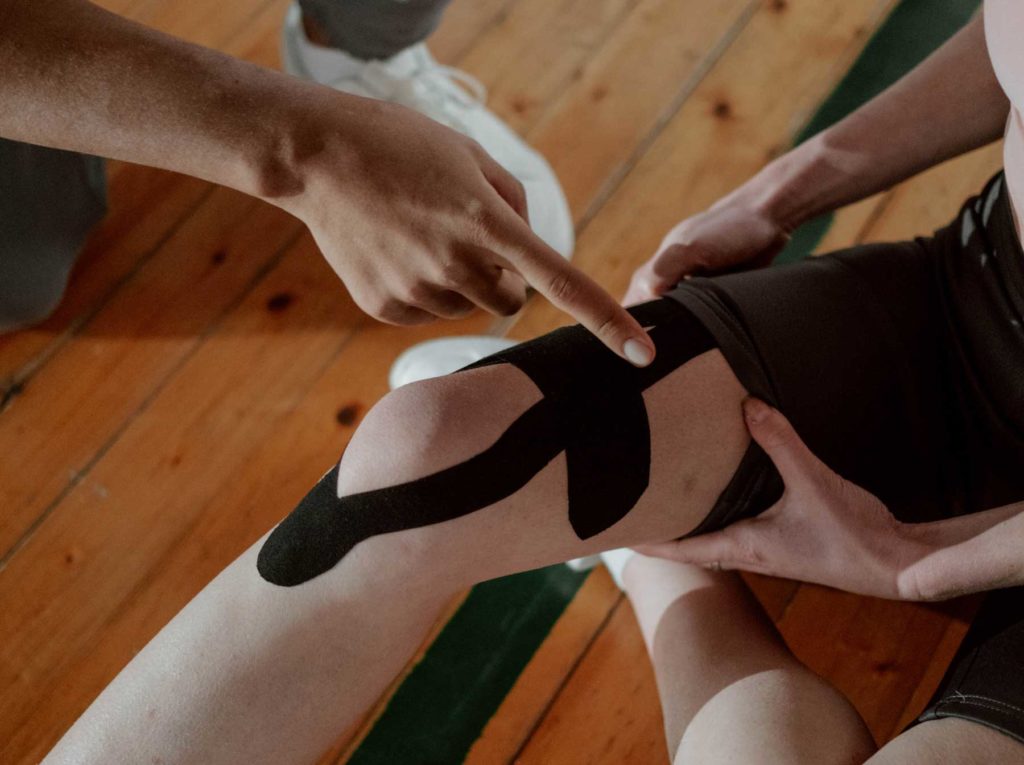Knee pain can affect people of all ages. It may develop as the result of an injury or a medical condition. Many types of knee pain-related issues respond well to home treatment while others can only be treated by a doctor.
Your knee is a complex joint, joining your thighbone to your shinbone. The kneecap, or patella, protects your knee joint and helps with extension and movement. Tendons connect the muscles of your legs to your bones, and ligaments hold the bones of your knee joint together. A small fluid-filled sac, known as the bursae, reduces friction and pressure. Issues with any part of this joint can cause knee pain.
Learn more about knee pain and how to treat it at home or with the support of an orthopaedic knee specialist.
About Knee Pain
The location and severity of knee pain can vary according to the underlying cause. Sometimes knee pain comes and goes, while other times it can be constant. Some types of knee pain do not respond to home treatment and require the care of a knee doctor. Consult with our orthopaedic doctors in CT if you:
- Are unable to bear weight on your knee.
- Feel as if your knee is unstable or if your knee “gives out.”
- Have marked swelling in your knee.
- Are unable to flex or fully extend your knee.
- Have an obvious deformity in your leg or knee.
- Have a fever in addition to pain, redness, and swelling in your knee.
- Have severe knee pain associated with an injury.
Your symptoms may help you determine the underlying cause of your knee pain. Arthritis may cause knee pain when walking, for example, while tendinitis can cause knee pain that comes and goes even while sedentary.
Why Are My Knees Hurting?
You may be experiencing knee pain due to an injury or a musculoskeletal condition. Knee pain may be temporary or chronic, depending on its underlying cause. In some cases, you will already know the cause of your knee pain. However, at other times, you will need the help of a doctor to diagnose your condition.
Knee Pain Causes
Injuries to the bones, cartilage, ligaments, tendons, or bursae can result in knee pain. Injuries that can cause knee pain include:
- An ACL injury. This occurs when there is a tear of the anterior cruciate ligament (ACL) that connects the shinbone to the thighbone. ACL injuries are common in people who play sports that require sudden changes in direction, such as basketball or soccer.
- Fractures. Bone fractures in the leg, ankle, foot, or knee can contribute to knee pain especially if you are putting more weight on one leg.
- A torn meniscus. The meniscus is the tough, rubbery cartilage that works as a shock absorber between your thighbone and your shinbone. Tears can occur when you suddenly twist your knee while holding your weight on it.
- Knee bursitis. This is caused by knee injuries.
- Patellar tendinitis. This is irritation and inflammation of one or more tendons that run from your kneecap (patella) to your shinbone and is common among runners, skiers, cyclists, and people involved in jumping sports and activities.
Medical conditions that cause knee pain include:
- A loose material, such as a piece of bone or cartilage, floating in the joint space.
- Iliotibial band syndrome, which causes pain when the tough band of tissue extending from the outside of your hip to the outside of your knee becomes so tight that it rubs against the outer portion of your thighbone. This is common among cyclists and distance runners.
- Dislocated kneecap.
- Hip or foot pain that causes you to change the way you walk.
- Arthritis. There are more than 100 different types of arthritis.
Knee Pain Treatment
Fortunately, most types of knee pain respond to treatment at home or as provided by your doctor.
At-Home Treatment
You may be able to treat your knee pain at home.
- Take over-the-counter pain relievers. Ibuprofen (Advil, Motrin IB) and naproxen sodium (Aleve) can help ease pain and reduce swelling. Be sure to ask your doctor if these medications are right for you, especially if you are taking prescription medications for other conditions.
- Use a numbing agent. Try rubbing the affected knee with a cream containing a numbing agent, such as lidocaine. Many people find relief with topical agents that contain capsaicin, which is the compound that makes chili peppers hot.
- Rest. Give the injured knee a rest from your normal activities. Resting your knee for a day or two can also help prevent further damage from a minor injury – a severely-injured knee may take more time to recover. Be careful not to rest too much. Resting your knee for too long can allow your muscles to get weak, which can increase joint pain in your knee.
- Ice. Applying ice to the affected knee eases pain and reduces inflammation. Use an ice pack wrapped in a thin towel to protect your skin – a bag of frozen peas also works well. To avoid damage to the skin and nerves, apply ice for no longer than 20 minutes at a time.
- Heat. A heating pad or hot water bottle may provide temporary pain relief.
- Compression. Holding pressure against the injury helps prevent fluid buildup in damaged tissues. Compression also helps the knee stay aligned correctly and stable. The best compression bandages are lightweight, self-adhesive, and breathable. The bandage should be tight enough to support your knee, but not so tight that it interferes with your blood circulation.
- Elevation. Propping your injured leg on pillows or sitting back in a recliner can help reduce swelling.
Knee Pain Treatment from a Doctor
A knee pain doctor has special training, diagnostic tools, and treatment expertise to help bring you knee pain relief. Knee pain treatment from your orthopaedic specialist can include:
- Medications to relieve pain and address certain underlying conditions that cause knee pain, such as gout and rheumatoid arthritis.
- Physical therapy to strengthen the muscles that support the knee.
- Injections of corticosteroids to reduce symptoms of arthritis or hyaluronic acid to lubricate the knee joint.
- Surgery, including arthroscopic surgery using a fiber-optic camera, partial knee replacement, or total knee replacement.
When knee pain prevents you from working, taking care of your family, or doing the things you enjoy, you need help from the best orthopaedic surgeons in CT. An orthopaedics specialist can help you determine the underlying cause of your knee pain and develop a treatment plan that really works.
Visit Valley Orthopaedic Specialists for Connecticut orthopedics specialists and the best orthopaedic surgeons in CT!

